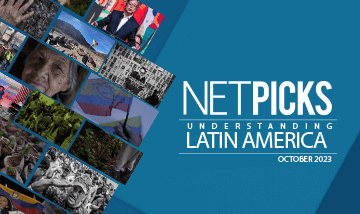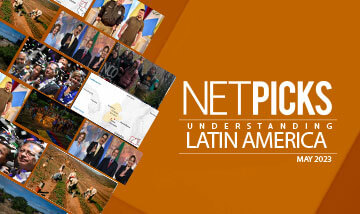Índice
Understanding Latin America
Dear readers and colleagues, this month we bring you six articles that reflect the current reality of Latin America. They include reports from Colombia, Guatemala, Haiti, and Brazil with it an exclusive article from Rosa Luxemburg Foundation’s office in that country, and another that looks at the impacts that feminism has had on politics in Latin America in general.
After a summer break, we will be back with the delivery of our newsletter in English in October.
- DRUG POLICY AND PATHWAYS TO PEACE IN COLOMBIA
- HOW THE CHRISTIAN RIGHT SHAPES BRAZILIAN SOCIETY
- WHAT’S BEHIND THE POST-ELECTION CRISIS IN GUATEMALA?
- HAITI NEWS ROUND-UP: TWO YEARS SINCE THE ASSASSINATION OF HAITI’S PRESIDENT
- VERÓNICA GAGO’S TERRITORIES OF REVOLT
.
DRUG POLICY AND PATHWAYS TO PEACE IN COLOMBIA
There has long been a major rift in Colombia over drug policy, between the policymakers who have demanded a ban of the production of coca, marijuana and poppies, and those on the ground who actually produce and consume the plants. Today it seems the tides are slowing turning, as President Gustavo Petro has shown an active interest in reviewing the legitimacy/legality of these “prohibited crops,” in order to advance peace in the country, he says. Real reforms might be a bit of an uphill battle for Colombia’s first left-wing president, however, given the stigma against these crops, and those that farm them. During Alvaro Uribe’s presidency, he famously referred to the coca leaf as “la mata que mata,” meaning “the weed that kills” or “the killer that kills,” playing on the dual meaning of “mata” in Spanish. Activists and farmers of these plants have long been saying local consumption of marijuana, coca and poppies have deep historical and cultural roots and should not be considered illegal. In other cases, these plants are cultivated because there are no other economic alternatives in the countryside. The article sites one member of the National Coordinator of Coca, Marijuana and Poppy Growers (Coccam) who said, “We aren’t killed by any weed. Neither coca, nor poppy, nor marijuana kill us. We are killed by hunger.” Will Petro take the producers and local consumers into account as he negotiates new drug policies?
Virginie Laurent, July 19, 2023
https://nacla.org/drug-policy-peace-colombia
.
HOW THE CHRISTIAN RIGHT SHAPES BRAZILIAN SOCIETY
The “March for Jesus” is the largest Evangelical event in Brazil carried out every June. It highlights one of the most significant social phenomena in Brazilian society over the past three decades: the increase in believers belonging to the Evangelical church, who are having a profound impact on local politics and culture. Understanding this phenomenon has become a necessity for all political camps today, says the author. The March for Jesus, held annually in Brazil since 1993, actively promotes controversial ideas like protecting the so-called “traditional family”, putting LGBTI rights in jeopardy, and opposing the legalization of abortion. Studies show that Evangelicals are no small force in Brazil. In 2020, they made up 30% of the country’s population, up from only 15% in 2020. The majority of these believers are women, black and from lower class backgrounds, who attend small churches that have sprung up across the country in people’s garages or backyards. The make-shift churches have offered community, support and a promise of prosperity to those who normally don’t have access to such resources. But over the years, they and their controversial moral convictions have made their way into politics, which is evident with Brazil’s former president: 70% of Evangelicals voted for Jair Bolsonaro in 2018. Can the current President Luiz Inácio Lula da Silva afford to dismiss this population, as he has been doing?
Delana Corazza, July 19, 2023
https://www.rosalux.de/en/news/id/50758/how-the-christian-right-shapes-brazilian-society
.
WHAT’S BEHIND THE POST-ELECTION CRISIS IN GUATEMALA?
Guatemala has plummeted into political turmoil following its general elections on June 25. After citizens took to the polls, two candidates came out on top with no clear majority and would advance to the second round of elections: Sandra Torres of the center-right National Unity of Hope (UNE) party and Bernardo Arévalo of the center anti-corruption Semilla Movement party. However, a week later, several right-wing parties alleged that fraud had taken place in the voting process and demanded that officials results not be released and a re-count be undertaken immediately. A day later, the Constitutional Court agreed, a move that has been met with widespread rejection both within and outside Guatemala. This article presents a reflection by Carlos Barrientos of the Committee for Peasant Unity in Guatemala about how the country got to this point. Here he explains that since 1954, Guatemala has been oppressing leftist candidates from taking part in elections, which later grew to include center candidates as well. In the meantime, right-wing politicians and insurgent military members formed an alliance known locally as “The Pact of the Corrupt” which took over the political scene. The right and extreme-right had not foreseen Arévalo´s popularity early enough, but they quickly tried to squash it by appealing to the Constitutional Court for a recount. Even if Arévalo does make it to the second round and wins, will he be able to rule the country whose congress and judicial system – dominated by the Pact of the Corrupt – is totally against him?
Carlos Barrientos Aragón, July 12, 2023
https://peoplesdispatch.org/2023/07/12/whats-behind-the-post-election-crisis-in-guatemala/
.
HAITI NEWS ROUND-UP: TWO YEARS SINCE THE ASSASSINATION OF HAITI’S PRESIDENT
July 7 marked two years since the Haitian President Jovenel Moïse was assassinated, but the ongoing investigations are moving at “unacceptable slowness,” according to the Office of Civil Protection in Haiti. One of the holdups is the constant replacement of judges overseeing the case. Judge Walter Wesser Voltaire is the fifth judge to oversee the investigations, after the first four resigned either for personal reasons, mainly fear of violent repercussions, or were replaced. The Office of Civil Protections called for greater protections of Judge Voltaire, but unclear if these calls will be answered. Meanwhile, some 40 alleged suspects remain in abysmal prison conditions in Haiti. The parallel investigations in the United States are also moving slowly, but they have made some major advancements. There are 11 people in US custody for their alleged roles in the killing, and their trial has once again been delayed until May 2024. The article is a round-up of media reports over the past year and an analysis of this complex case, the two ongoing trials, and the gag order US courts have placed on investigators prohibiting them from sharing information or intelligence with Haiti. This round-up also tracks the debates among the international community about how much, if at all, to intervene in the violence in Haiti, which has largely been taken over by armed groups. The result has been a variety of botched discussions. Is Haiti doomed to live out this crisis on its own?
Chris François & Jake Johnston, July 18, 2023
https://cepr.net/haiti-news-round-up-two-years-since-the-assassination-of-haitis-president/
.
VERÓNICA GAGO’S TERRITORIES OF REVOLT
This article presents an exclusive interview with Veronica Gago, Argentine feminist scholar and activist, who is considered a fundamental figure within feminist movements in Latin America today. She, along with colleague and friend, Silvia Federici have expanded feminist discussions from traditional isolated demands, like unpaid labor and the right to choose, to include and help grow coordinated movements across bodies and geographies. Gago, who helped lead the #niunamenos (not one more) movement in Argentina against femicides, released a book in 2019 called La Potencia Feminista (The Feminist International), which serves as a map to amplify feminist politics and terrain. Here, the authors delve into complex topics with Gago like: how feminism has become a powerful protagonist in recent years and how this has changed the way we think about politics; the art of speculation from a feminist perspective; and how feminists have expanded the notion of violence to include financial violence, like the impact on citizens when governments take on IMF loans. Their discussion ends with a reflection on the yearly women’s strike on March 8, with Gago emphasizing the importance of seeing this as a process that is constantly evolving to take on different meanings and becoming more inclusive, rather than an event. Where will feminist scholarship go from here?
Julianne Chandler & Pamela Calla, July 7, 2023
https://nacla.org/veronica-gago-territories-revolt




